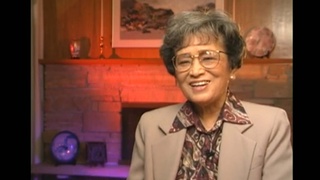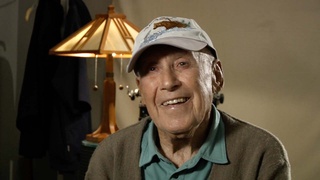Interviews
Train ride to Jerome Relocation Center
I just doesn't recall how long it take, but anyway, thinking about other things and so mad. Now concentration -- they didn't say relocation, they said concentration camp, you know, everybody. And other people, see, I understand Japanese so the Issei talkin' about, very sad and loss of things and what it is that they didn't able to harvest some things, and some owner or the neighbor or the worker that took over and they sold the things but didn't send the money and things like -- all kinda sad stories. And I didn't complain, and I don't talk to them, I just listen. I understand, sad, and I don't want to, them to feel more bad or sad, so I just kept quiet.
Date: December 17 & 18, 2003
Location: Washington, US
Interviewer: Alice Ito, Tom Ikeda
Contributed by: Denshō: The Japanese American Legacy Project.
Explore More Videos

Erasing the Bitterness
(1923–2008) One of the leaders behind the redress movement.


Poignant story from the CWRIC hearing in San Francisco
(1917 - 2004) Political activist

Loyalty questionnaire
(1916-2010) draft resister, helped form the Heart Mountain Fair Play Committee

Speaking out in camp
(1916-2010) draft resister, helped form the Heart Mountain Fair Play Committee

Resisting transfer from Jerome
(1919 - 2006) World War II and Korean War veteran

Would do the same again
(1916-2010) draft resister, helped form the Heart Mountain Fair Play Committee

A visit to Jerome after OCS
(1919 - 2006) World War II and Korean War veteran

Traumatic experiences before camp
(1913-2013) Doctor specializing in obstetrics in Southern California

“Everybody went in like sheep”
(1913-2013) Doctor specializing in obstetrics in Southern California

Going to camp with the Terminal Island people
(1927-2010) Political Activist


Interned at age fifteen, I saw camp as an adventure
(1927-2010) Political Activist


Reception of Hamako by family
(1916 - 2013) Member of the U.S. Military Intelligence Service
